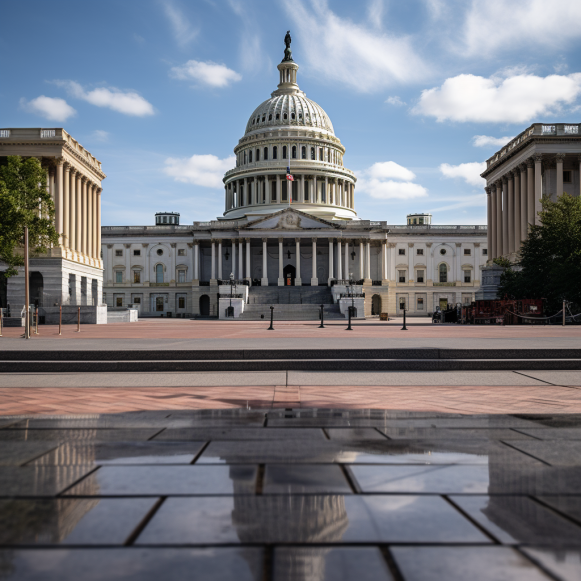How would a government shutdown affect you?

With only a few days until a potential federal government shutdown, you may be wondering what this has to do with you.
Every year, Congress passes 12 appropriations bills to keep the government running until the fiscal year ends on September 30. This year, House Speaker Kevin McCarthy, R-CA, desired to negotiate, putting the fate of federal service operations in doubt.
If Congress does not act quickly to approve a new spending package or reach an agreement on a stopgap measure to delay the shutdown, the government will shut down on Sunday. However, even a complete shutdown does not close all doors.
A government shutdown would disrupt many federal government agencies and operations. This means that non-essential services would be cut, while other programs receiving mandatory funding would be spared. You don’t have to be concerned about things like air traffic control or power grid maintenance.
Furloughed federal employees will bear the brunt of the disruption. The shutdown will end only when Congress can reach an agreement on funding.
Meanwhile, here’s how a government shutdown might affect the following:
Social Security benefits
People receiving Social Security benefits will continue to receive them.
However, applicants for Social Security Disability Insurance (SSDI) who are still awaiting a decision may have to wait longer due to potential delays at state agencies that handle decision-making but are funded by the Social Security Administration. However, it will continue to process benefit applications, issue Social Security cards, and handle administrative requests such as direct deposit setups and address changes.
Food stamps/SNAP assistance
The Supplemental Nutrition Assistance Program (SNAP) — formerly known as “food stamps” — and the Special Supplemental Nutrition Program for Women, Infants, and Children (WIC) will not be affected.
Both programs have contingency funds, but if the shutdown lasts longer than 30 days, the Department of Agriculture (USDA) may find it difficult to continue operations. According to the White House, WIC will be completely shut down a few days after the federal contingency fund runs out.
The USDA will determine how long SNAP delivery will continue. During the 34-day partial government shutdown in 2018-2019, the USDA collaborated with state agencies to keep the program running throughout.
Medicaid and Medicare
According to the Social Security Administration’s (SSA) contingency plan, both Medicaid and Medicare benefits would continue to be provided.
However, some administrative functions of the programs, such as:
- Obtaining new Medicare cards.
- Verification of benefits.
- Responses to information requests from third parties or Freedom of Information Act requests.
- Processing of overpayments.
- Inmate activities.
According to the SSA, if necessary, the SSA would increase the number of employees exempt from furlough to keep operations running, as it did during the 2013 shutdown.
Unemployment compensation
During a government shutdown, unemployment benefits will be maintained. The program is overseen by the Department of Labor, but unemployment compensation is administered by states. Because the federal government pays administrative costs, there may be a delay in processing applications if the shutdown continues.
Employees who are furloughed will continue to be eligible for unemployment benefits in some states, but they may be required to return any funds received when the shutdown ends and they receive back pay. Those who are required to work without pay are not eligible for unemployment benefits.
Student loans and college financial aid
Even if there is a government shutdown, plan to pay your federal student loan bill in October. Because the repayment system is managed by service providers rather than the government, it should continue to function normally. Borrowers seeking loan forgiveness or consolidation may face delays because those requests are routed directly to the Education Department.
Current students’ federal financial aid is unlikely to be affected because they typically receive grant and loan funds at the start of the semester.
A government shutdown could have an impact on borrowers who plan to attend college next year by delaying the Free Application for Federal Student Aid (FAFSA). The Education Department currently plans to release the newly simplified 2024-25 FAFSA sometime in December, a month later than the usual Oct. 1 deadline.
Airline travel
Air traffic controllers for the Federal Aviation Administration, like TSA officers, are federal employees who are expected to work without pay during a government shutdown. Some employees will inevitably refuse to report to work if they are not paid, and even a few absences can bring the nation’s aviation system to a halt.
During the 2019 government shutdown, the absence of ten air traffic controllers resulted in a temporary grounding at New York’s LaGuardia airport, as well as delays at other major East Coast airports.
If the shutdown continues, air travelers will likely face more flight delays and cancellations. It may also delay the FAA’s hiring and training of new air traffic controllers, implying that even after the shutdown is over, airline reliability may not improve significantly.






